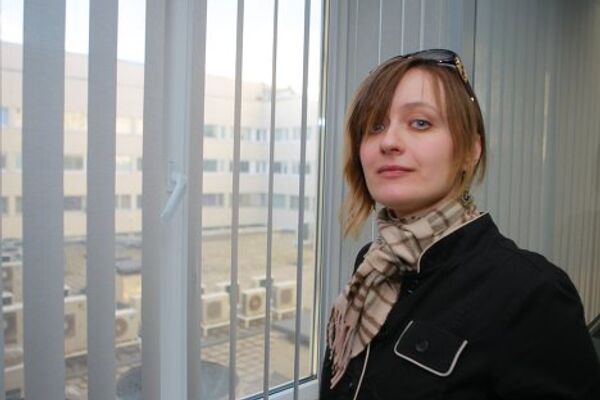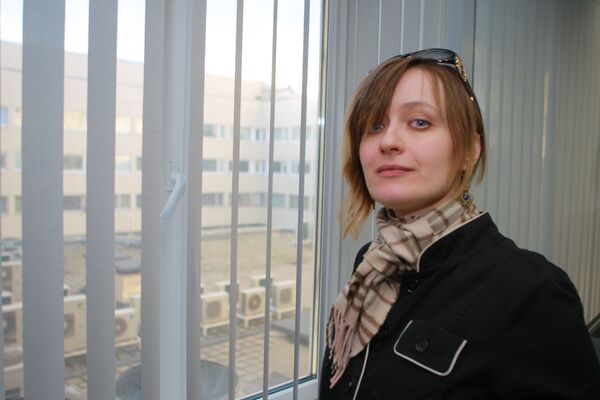To call corruption on the post-Soviet landscape “shameless” is to say nothing. You might as well say that the sun is “a bit on the warm side” or that the Russian winter tends to be “somewhat chilly.”

Still, there was something particularly galling about a report by the tabloid LifeNews on the shopping trips that Yevgeniya Vasilyeva, a scandalous former Defense Ministry official, has been taking while she technically remains under house arrest.
Vasilyeva, who denies the charges against her, was placed under house arrest soon after the corruption probe into the Defense Ministry’s dealings publicly kicked off, successfully petitioned to be allowed three-hour walks beyond the walls of her luxury apartment in Moscow’s Molochny Pereulok.
Having previously celebrated her lavish lifestyle in a book of poetry, Vasilyeva might have struggled to get by without trips to designer boutiques – even in these tough times. So, the woman at the center of a corruption scandal that may have cost the Russian government untold millions browses Donna Karan dresses while peeking out from behind her enormous sunglasses, shielded by the kind of privilege that, in Russia, comes with being a high-placed bureaucrat (even a former, disgraced high-placed bureaucrat).
Can you imagine one of the people wallowing in detention over the May 6 2012 anti-Putin rally that descended into violence being allowed such extravagances? Of course not. And even though the press has had a field day with Vasilyeva’s shopping trips, the truth is, most people have long since accepted that this kind of shamelessness is a natural part of being a member of the ruling class, even when you’re facing legal trouble.
If anything, Vasilyeva’s outings are the perfect illustration of the systemic problems of social inequality in today’s Russia. The gap between rich and poor seems so enormous and so pronounced that the hatred people feel for figures like Vasilyeva is manifested in a kind of helplessness. Even as ordinary people want to see Vasilyeva brought low, they can’t help but feel resigned to the fact that she will continue to enjoy special treatment.
Contrast Vasilyeva’s outings with the recent report in the Kommersant newspaper on the fact that people in small-town Russia have been taking out consumer loans at an alarming pace – and that the implications for the economy could be severe.
The report, published this week, profiled low-income families who took on a debt to achieve a semblance of a “normal life.” Russians who are desperate to have a working washing machine or decent clothes for their kids are taking out loans with huge interest rates – advertisements for which are conveniently springing up everywhere you look. New bankruptcy laws are set to make things easier for those who owe over 300,000 rubles – but according to Kommersant, declaring bankruptcy will still take two years in Russia and will be fairly expensive for those who are already deep into a financial nightmare.
There are no statistics on how many people later wind up committing suicide as they face financial ruin – but some of the individual stories featured in Kommersant were harrowing. Take, for example, Olga Kirova (not her real name), from Novgorod. Last autumn, Olga took her nine-year-old daughter on a birthday trip out of town. Olga didn’t own a dacha, but she did have a shed on a small piece of land, which was where she brought her daughter. At the time, Olga was suffering from crushing depression after taking out several payday loans. She was, simply put, drowning in debt.
In the shed, Olga took out a razor and sliced her wrists and neck open. When the little girl saw the blood, she started to scream – so Olga stabbed her eight times in the neck. At that point, Olga couldn’t bear to finish what she started – so she called her relatives on her cellphone, and they in turn called an ambulance. Miraculously, both the woman and the little girl survived. Olga is now serving a five-year sentence in a penal colony, after the court decided that the attack was not premeditated and that Olga was simply out of her mind from desperation at the prospect of financial destitution. Her little girl has been placed under the guardianship of her grandmother. Imagine what her life is like today – waiting for mom, who tried to stab her to death, to be released from prison.
What does all of this have to do with Vasilyeva? A lot, actually.
In modern-day Russia, people have been taught to equate luxury with dignity. Most ordinary people believe that those living the high life probably got there dishonestly – but still try to emulate them, and the only way to do that is, more often than not, by getting into massive debt.
Poverty is humiliating in any context, but lack of social mobility and the legal nihilism regularly demonstrated by Russia’s upper (ruling) class makes it particularly punishing. While Russia’s growing middle class may, eventually, cause a shift in the landscape, for now, too many people still believe that the only way to have a dignified life is to either steal or borrow with abandon.
Trendwatching in Russia is an extreme sport: if you’re not dodging champagne corks at weddings, you’re busy avoiding getting trampled by spike heels on public transportation. Thankfully, due to an amazing combination of masochism and bravado, I will do it for you while you read all about it from the safety of your living room.
Natalia Antonova is the acting editor-in-chief of The Moscow News. She also works as a playwright – her work has been featured at the Lyubimovka Festival in Moscow and Gogolfest in Kiev, Ukraine. She was born in Ukraine, but spent most of her life in the United States. She graduated from Duke University, where she majored in English and Slavic Literature. Before coming to Moscow, she worked in Dubai, UAE and Amman, Jordan. Her writing has been featured in The Guardian, Foreign Policy, Russia Profile, AlterNet, et al.
Trendwatcher: The Scandalous Truth About Russian Men
Trendwatcher: Of Russian Tourists, Egyptian Violence, and Fate
Trendwatcher: Moscow’s Migrant Problem – And Lack of Community
Trendwatcher: Mizulina, Gay Activists – And Fame
Trendwatcher: Navalny and the Train Station Blues
Trendwatcher: Russia, Self-Defense and Trayvon Martin
Trendwatcher: Expat Women in Moscow: When Dating is No Disaster
Trendwatcher: Yarovaya and WWII: With Friends Like These…



